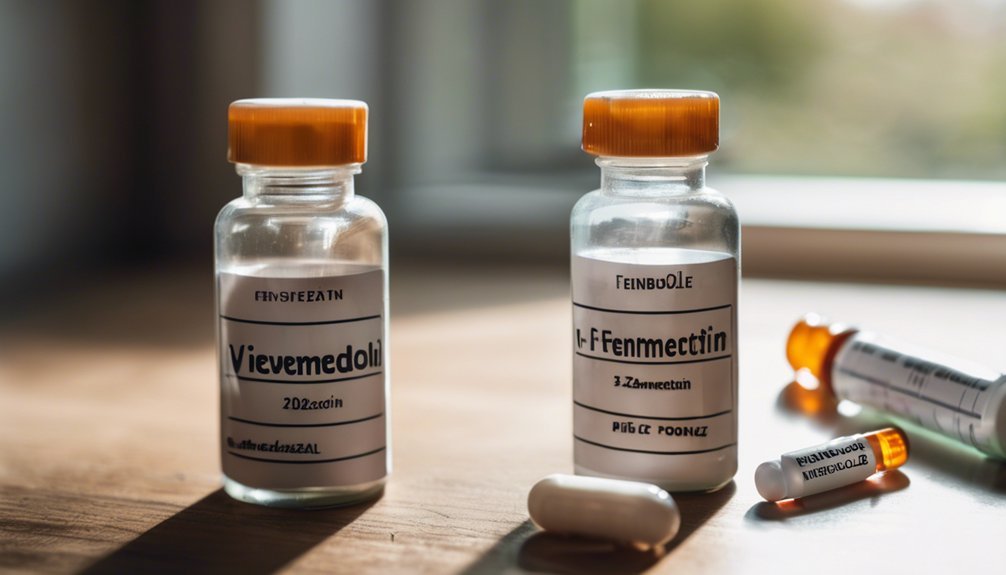Ivermectin, primarily known for its use in treating parasitic infections, is now being investigated for its potential role in cancer therapy. Current clinical trials are exploring how this drug might induce apoptosis in cancer cells and enhance existing treatment methods. However, despite some promising findings, significant challenges remain. Understanding these trials and their implications could reshape cancer care, but the journey is far from straightforward.
Key Takeaways
- Ivermectin, originally an antiparasitic, shows potential anticancer effects, prompting interest in its repurposing for cancer treatment.
- Current clinical trials are investigating ivermectin’s efficacy across various cancer types and treatment combinations, with active patient enrollment ongoing.
- Research indicates ivermectin may induce cancer cell apoptosis and enhance drug synergy with existing therapies, potentially overcoming resistance mechanisms.
- Safety concerns include side effects like dizziness and nausea, alongside challenges with funding and regulatory hurdles impacting large-scale trial validation.
- Effective communication and equitable access to clinical trials are crucial for informed patient decision-making regarding ivermectin as a treatment option.
Background on Ivermectin and Its Original Uses

Ivermectin, originally developed as an antiparasitic agent, has gained widespread acclaim for its effectiveness against various parasitic infections in humans and animals.
Ivermectin has garnered significant recognition for its remarkable efficacy in combating diverse parasitic infections in both humans and animals.
Its history traces back to the late 1970s when it was discovered from the fermentation products of a soil bacterium, Streptomyces avermitilis.
Initially, ivermectin’s original applications included treating conditions like river blindness and lymphatic filariasis, significantly improving global health outcomes.
The drug’s safety and efficacy led to its World Health Organization inclusion in the List of Essential Medicines.
Over time, ivermectin’s positive impact on public health has fostered interest in exploring its potential beyond its original applications.
This curiosity has paved the way for research into its use in various medical fields, including cancer treatment.
The Rationale for Repurposing Ivermectin in Cancer
As researchers delve deeper into the mechanisms of cancer, they’ve identified potential pathways through which established drugs like ivermectin could exert anticancer effects. This opens doors for drug repositioning strategies that leverage existing medications for new therapeutic applications.
Ivermectin, originally used as an anti-parasitic, has shown promise in inhibiting various cancer cell lines in preliminary studies. By integrating ivermectin into cancer treatment innovation, you can potentially enhance the effectiveness of current therapies and improve patient outcomes.
Repurposing this drug not only accelerates the development process but also reduces costs associated with creating new drugs. This approach allows you to explore viable treatment options while contributing to the ongoing fight against cancer, ultimately benefiting those in need of effective therapies.
Mechanisms of Action: How Ivermectin May Target Cancer Cells
While traditional cancer treatments often focus on targeting rapidly dividing cells, ivermectin may engage multiple mechanisms that disrupt cancer cell viability.
It activates specific targeting mechanisms that induce cancer apoptosis, effectively promoting programmed cell death. By influencing molecular pathways, ivermectin can interfere with cell survival signals, leading to reduced tumor growth.
Additionally, its potential for drug synergy enhances the efficacy of existing therapies, allowing for a more comprehensive approach to cancer treatment. This multi-faceted action may help overcome resistance mechanisms often seen in cancer cells.
Understanding these pathways not only broadens the therapeutic options available but also supports the notion of repurposing ivermectin as a valuable tool in the fight against cancer.
Overview of Current Clinical Trials

Given the promising mechanisms of action identified in preclinical studies, numerous clinical trials are currently underway to evaluate ivermectin’s efficacy in cancer treatment.
These trials span various clinical trial phases, from early-phase safety assessments to larger, randomized studies aimed at determining effectiveness. Researchers are actively seeking patient enrollment to ensure diverse participant representation, which is crucial for reliable results.
Many trials focus on specific cancer types, examining ivermectin’s potential as a standalone therapy or in combination with existing treatments.
As these studies progress, they aim to provide valuable insights into how ivermectin may impact cancer outcomes, ultimately benefiting patients and healthcare providers alike.
Staying informed about these trials can help you understand the evolving landscape of cancer treatment options.
Promising Results From Early Studies
Recent studies have shown promising results regarding ivermectin’s potential role in cancer treatment, igniting interest among researchers and clinicians. Early findings suggest that ivermectin may enhance the efficacy of certain chemotherapy agents, potentially improving treatment outcomes.
These studies indicate that ivermectin could induce apoptosis in cancer cells and reduce tumor growth in various models, which raises significant clinical implications for future therapies. As you consider the potential of repurposing ivermectin, it’s vital to stay informed about ongoing trials that may further elucidate its mechanisms.
Safety and Side Effect Profile of Ivermectin in Cancer Patients
Ivermectin’s safety and side effect profile in cancer patients is crucial for determining its viability as a treatment option. While generally well-tolerated, it’s essential to consider specific safety concerns in this vulnerable population.
Common side effects may include dizziness, nausea, and diarrhea, which, although often mild, can affect a patient’s quality of life. In cancer patients, the risk of drug interactions and compounded side effects from concurrent treatments heightens the need for careful monitoring.
Additionally, more serious adverse effects, though rare, warrant attention. Establishing a clear understanding of these factors will help healthcare providers make informed decisions, ultimately aiming to enhance patient care and outcomes while minimizing risks associated with ivermectin therapy.
Challenges and Limitations in Research

While understanding the safety and side effects of ivermectin in cancer patients is important, you also need to consider the challenges and limitations inherent in researching its repurposing for cancer treatment.
One significant research obstacle is the lack of robust funding, which can hinder large-scale trials necessary for validation.
Additionally, regulatory hurdles often delay the approval process for studies, impacting timely progress.
The study design also presents challenges, as researchers must balance rigor with practicality, ensuring that results are both scientifically valid and clinically relevant.
Researchers face the challenge of balancing scientific rigor with practical considerations to ensure clinically relevant results.
These factors collectively complicate the effort to establish ivermectin’s efficacy in oncology, making it crucial for stakeholders to navigate these challenges effectively to advance research in this promising area.
Future Directions for Ivermectin in Oncology
As researchers explore new avenues in oncology, the repurposing of ivermectin presents exciting possibilities for cancer treatment. Future applications of ivermectin may include combination therapies, targeted drug delivery systems, and immunomodulatory effects. To maximize these opportunities, fostering research collaborations among institutions, pharmaceutical companies, and clinical practitioners will be vital.
| Future Application | Potential Benefit | Collaboration Opportunity |
|---|---|---|
| Combination Therapies | Enhanced efficacy | Universities and biotech firms |
| Targeted Drug Delivery | Reduced side effects | Clinical research networks |
| Immunomodulatory Effects | Improved patient outcomes | Cancer research organizations |
Patient Perspectives and Real-World Implications
How do patients perceive the potential use of ivermectin in cancer treatment? Many express hope, yet concern about treatment expectations and the emotional impact on their lives.
Patient experiences often highlight the importance of quality of life and the role of support networks in navigating their journeys. As you consider ivermectin, you may face communication barriers that complicate decision-making processes.
Understanding the evidence supporting this repurposing can help you weigh the benefits against risks. It’s crucial to address healthcare access, as not all patients have equal opportunities to explore innovative treatments like ivermectin.
Engaging with your healthcare team can empower you to make informed choices, ultimately enhancing your overall experience and well-being.
Frequently Asked Questions
Can Ivermectin Be Used Alongside Traditional Cancer Treatments?
Ivermectin can potentially enhance traditional cancer treatments through treatment synergy, but you must consider its interactions with other drugs. Always consult healthcare professionals before combining therapies to ensure safety and effectiveness in your care plan.
What Types of Cancer Are Being Studied With Ivermectin?
Imagine a battle against cancer’s shadows; researchers are studying ivermectin’s potential in lung and breast cancer. They’re exploring whether this repurposed drug can illuminate new paths toward hope and healing for patients in need.
Are There Specific Patient Populations That Should Avoid Ivermectin?
You should avoid ivermectin if you’re a high-risk patient with contraindicated conditions, such as severe liver disease or allergies to the drug. Always consult your healthcare provider to ensure safety before starting any treatment.
How Can Patients Participate in Ongoing Clinical Trials for Ivermectin?
To participate in ongoing clinical trials for ivermectin, check trial registration websites for patient eligibility criteria. You’ll find essential information about enrollment, study locations, and requirements that help you make informed decisions about joining.
What Is the Cost of Ivermectin for Cancer Treatment?
You might be wondering about ivermectin pricing for cancer treatment. While costs can vary significantly, many seek affordable options. It’s crucial to consult with healthcare providers to explore potential financial support and treatment accessibility.
Conclusion
In the unfolding narrative of cancer treatment, ivermectin emerges as a potential beacon of hope, illuminating new pathways for patient care. As clinical trials advance, the promise of this repurposed drug could transform the oncology landscape, offering fresh strategies against relentless foes. Yet, the road ahead is fraught with challenges, requiring collaboration and innovation. As researchers delve deeper, the quest for improved outcomes continues, bringing us closer to the dawn of a new era in cancer therapy.




